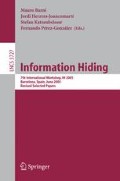Abstract
We study the effect compulsion attacks, through which an adversary can request a decryption or key from an honest node, have on the security of mix based anonymous communication systems. Some specific countermeasures are proposed that increase the cost of compulsion attacks, detect that tracing is taking place and ultimately allow for some anonymity to be preserved even when all nodes are under compulsion. Going beyond the case when a single message is traced, we also analyze the effect of multiple messages being traced and devise some techniques that could retain some anonymity. Our analysis highlights that we can reason about plausible deniability in terms of the information theoretic anonymity metrics.
Access this chapter
Tax calculation will be finalised at checkout
Purchases are for personal use only
Preview
Unable to display preview. Download preview PDF.
References
Acquisti, A.: Receipt-free homomorphic elections and write-in ballots. Technical Report 105, International Association for Cryptologic Research, May 2 (2004)
Anderson, R.: Two remarks on public-key cryptology. Invited Lecture. In: ACM-CCS 1997 (1997), Available at http://www.cl.cam.ac.uk/ftp/users/rja14/forwardsecure.pdf
Anderson, R., Needham, R., Shamir, A.: The steganographic file system. In: Aucsmith, D. (ed.) IH 1998. LNCS, vol. 1525, pp. 73–82. Springer, Heidelberg (1998)
Bohme, R., Danezis, G., Diaz, C., Kopsell, S., Pfitzmann, A.: Mix cascades vs. peer-to-peer: Is one concept superior. In: Privacy Enhancing Technologies (PET 2004), Toronto, Canada (May 2004)
Brown, Z.: Cebolla – pragmatic IP anonymity. In: Ottowa Linux Symposium (June 2002)
Canetti, R., Halevi, S., Katz, J.: A forward-secure public-key encryption scheme. In: Biham, E. (ed.) EUROCRYPT 2003. LNCS, vol. 2656, pp. 255–271. Springer, Heidelberg (2003)
Chaum, D.: Untraceable electronic mail, return addresses, and digital pseudonyms. Communications of the ACM 24(2), 84–88 (1981)
Chaum, D.: Secret-ballot receipts: True voter-verifiable elections. RSA Laboratories Cryptobytes 7(2), 14–27 (Fall 2004)
Clayton, R., Danezis, G.: Chaffinch: Confidentiality in the face of legal threats. In: Petitcolas, F.A.P. (ed.) IH 2002. LNCS, vol. 2578, pp. 70–86. Springer, Heidelberg (2003)
Danezis, G.: Forward secure mixes. In: Fisher-Hubner, J. (ed), Nordic workshop on Secure IT Systems (Norsec 2002), Karlstad, Sweden, pp. 195–207 (November 2002)
Danezis, G.: Designing and attacking anonymous communication systems. Technical Report UCAM-CL-TR-594, University of Cambridge, Computer Laboratory (2004)
Danezis, G., Dingledine, R., Mathewson, N.: Mixminion: Design of a Type III Anonymous Remailer Protocol. In: IEEE Symposium on Security and Privacy, Berkeley, CA, May 11-14 (2003)
Danezis, G., Laurie, B.: Minx: A simple and efficient anonymous packet format. In: Workshop on Privacy in the Electronic Society (WPES 2004). ACM, New York (2004)
Dingledine, R.: Personal communication (2003)
Dingledine, R., Mathewson, N., Syverson, P.: Tor: The second-generation onion router. In: Proceedings of the 13th USENIX Security Symposium (August 2004)
Freedman, M.J., Morris, R.: Tarzan: A peer-to-peer anonymizing network layer. In: Atluri, V. (ed.) ACM Conference on Computer and Communications Security (CCS 2002), pp. 193–206. ACM, New York (2002)
Helsingius, J.: Johan helsingius closes his internet remailer (August 1996), http://www.penet.fi/press-english.html
Helsingius, J.: Johan helsingius gets injunction in scientology case privacy protection of anonymous messages still unclear (September 1996), http://www.penet.fi/injunc.html
Helsingius, J.: Temporary injunction in the anonymous remailer case (September 1996), http://www.penet.fi/injuncl.html
Menezes, A.J., Van Oorschot, P.C., Vanstone, S.A.: Handbook of Applied Cryptography. CRC Press, Boca Raton (1996); ISBN: 0-8493-8523-7
Reiter, M., Rubin, A.: Crowds: Anonymity for web transactions. ACM Transactions on Information and System Security (TISSEC) 1(1), 66–92 (1998)
Rennhard, M., Plattner, B.: Introducing MorphMix: Peer-to-Peer based Anonymous Internet Usage with Collusion Detection. In: Workshop on Privacy in the Electronic Society (WPES 2002), Washington, DC, USA (November 2002)
Roe, M.: Cryptography and Evidence. PhD thesis, University of Cambridge, Computer Laboratory (1997)
Serjantov, A., Danezis, G.: Towards an information theoretic metric for anonymity. In: Dingledine, R., Syverson, P.F. (eds.) PET 2002. LNCS, vol. 2482, pp. 41–53. Springer, Heidelberg (2003)
Shmatikov, V.: Probabilistic analysis of anonymity. In: Computer Security Foundations workshop (CSFW-15 2002), Cape Breton, Nova Scotia, Canada, pp. 119–128. IEEE Computer Society, Los Alamitos (2002)
Wright, M., Adler, M., Levine, B.N., Shields, C.: An analysis of the degradation of anonymous protocols. In: Network and Distributed Security Symposium (NDSS 2002), San Diego, California, February 6-8 (2002)
Author information
Authors and Affiliations
Editor information
Editors and Affiliations
Rights and permissions
Copyright information
© 2005 Springer-Verlag Berlin Heidelberg
About this paper
Cite this paper
Danezis, G., Clulow, J. (2005). Compulsion Resistant Anonymous Communications. In: Barni, M., Herrera-Joancomartí, J., Katzenbeisser, S., Pérez-González, F. (eds) Information Hiding. IH 2005. Lecture Notes in Computer Science, vol 3727. Springer, Berlin, Heidelberg. https://doi.org/10.1007/11558859_2
Download citation
DOI: https://doi.org/10.1007/11558859_2
Publisher Name: Springer, Berlin, Heidelberg
Print ISBN: 978-3-540-29039-1
Online ISBN: 978-3-540-31481-3
eBook Packages: Computer ScienceComputer Science (R0)

